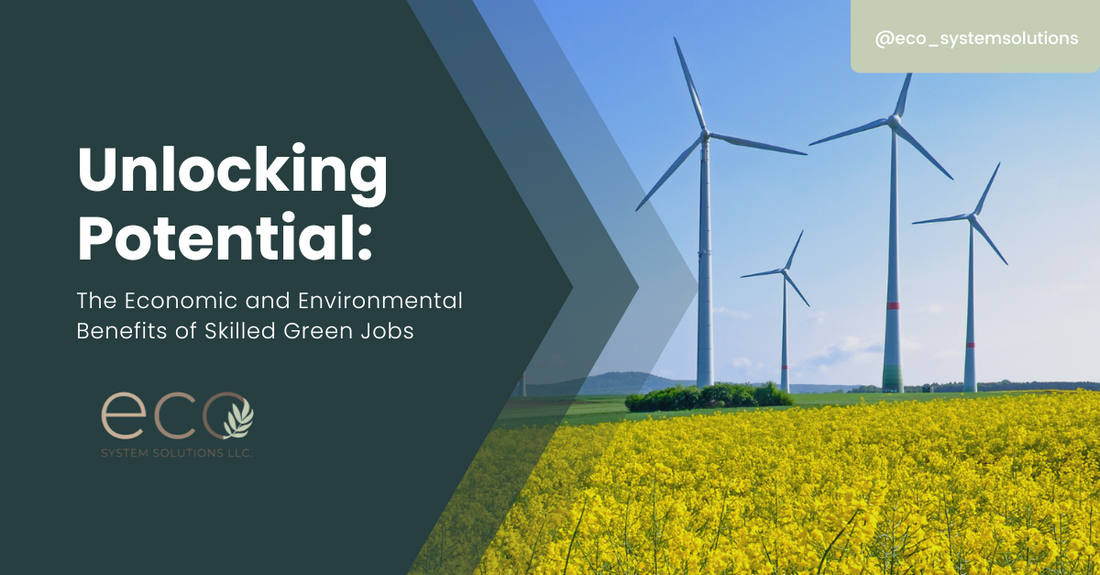Introduction
In the landscape of today's workforce, skilled green jobs stand tall as opportunities to create a sustainable future. These specialized roles aren't just career paths; they're key instruments in advancing our economy, preserving the environment, and building a future where innovation and sustainability intersect.
As we witness the evolving dynamics of employment, the surge in skilled green jobs holds fresh promise. Imagine a world where careers align not just with financial security but also with environmental consciousness. From solar panel technicians to renewable energy engineers, these professions signify the evolution of work, marking the inception of a new era. In this blog, we'll journey through the landscape of these skilled green jobs, uncovering their pivotal role in the modern economy and their significant impact on our environment.
Understanding Skilled Green Jobs
The essence of skilled green jobs lies in their core function: blending expertise and innovation to navigate towards a more sustainable future. These positions encompass a range of careers across various sectors that contribute directly or indirectly to environmental sustainability. Occupations in renewable energy, resource conservation, energy efficiency, and waste reduction constitute the fabric of skilled green jobs. Whether it's a solar panel installer harnessing the power of the sun, a sustainability consultant strategizing for eco-friendly solutions, or a water quality technician ensuring clean resources, these professions reflect a commitment to environmental preservation while addressing the pressing concerns of our time.
Climate change remains one of the defining challenges of our era. Skilled green jobs hold a critical role in mitigating its impact. From crafting policies for a carbon-neutral world to deploying innovative technologies to reduce carbon footprints, these roles are intricately interwoven with the mission to counteract climate change. By fostering energy efficiency, increasing reliance on renewable sources, and advocating for sustainable practices, skilled green jobs become the linchpin in our collective fight against the environmental perils threatening our planet.
Economic Impact of Skilled Green Jobs
The economic landscape is significantly transformed by the rise of skilled green jobs. These roles not only bolster the workforce but also present an opportunity for substantial economic growth. With the expanding focus on renewable energy, resource conservation, and sustainable practices, skilled green jobs have become a driving force behind the employment surge. Statistics reveal the dynamic nature of these roles, painting a picture of exponential growth. For instance, in the last decade, the U.S. Bureau of Labor Statistics notes a robust expansion in renewable energy jobs, surging at a rate 3.8 times faster than the overall economy.
Skilled green jobs possess the potential for lucrative incomes, often surpassing traditional roles. Industries fostering these jobs boast competitive wages, providing a stable and often higher-than-average income for employees. The economic viability of skilled green jobs extends beyond individual paychecks; it fundamentally stimulates local economies. Whether it's the burgeoning demand for solar installations, the need for environmental consultants, or the growth of eco-friendly construction, these roles trigger ripples across various industries, fueling economic development at the community level.
______________________________________________________
NEW E2 Report: 403K jobs to be created from clean energy projects announced 1 year after Inflation Reduction Act
______________________________________________________
Training and Education
Embarking on a career in skilled green jobs necessitates a diverse set of educational pathways and training. The preparation for these roles is not only diverse but also inclusive, accommodating a wide array of individuals with varying educational backgrounds. For some positions, specialized degrees, such as environmental science, sustainability studies, or engineering, become the bedrock of knowledge. These degrees provide an in-depth understanding of the principles and practices that form the backbone of sustainable industries. Simultaneously, vocational training and certification programs cater to those seeking a more direct, skill-specific route. Training institutes and programs focusing on solar panel installation, wind turbine maintenance, or sustainable agriculture offer hands-on learning opportunities, empowering individuals with the necessary expertise.
Certifications also play a pivotal role in the journey toward skilled green jobs. Acquiring relevant certifications bolsters credentials, demonstrating proficiency and commitment to sustainable practices. Certifications vary widely across industries, covering diverse sectors, including energy efficiency, resource management, or sustainable design. Institutions, both academic and specialized vocational centers, play a critical role in offering these programs. Universities and community colleges often provide specialized courses, while specialized vocational centers and training programs cater to those seeking focused and skill-oriented education. Leveraging these resources empowers individuals to step into the ever-growing arena of skilled green jobs with proficiency and knowledge, prepared to tackle the challenges of a sustainable future.
In-Demand Green Jobs
Navigating the landscape of skilled green jobs uncovers a multitude of opportunities in various sectors. Roles such as solar photovoltaic installers, wind turbine technicians, environmental engineers, and sustainability specialists are among the most in-demand. These professions carry varied responsibilities, from designing and implementing sustainable technologies to assessing environmental impacts and creating strategies for resource conservation. The remuneration for these jobs is promising, with most roles offering competitive salary ranges and promising avenues for career progression and growth. For instance, the average salary for a wind turbine technician is estimated at $56,230, and the profession is projected to grow by 61% in the coming years, significantly faster than other occupations.
Challenges and Opportunities
Though the landscape for skilled green jobs is promising, it’s not without its challenges. Overcoming hurdles such as the need for consistent upskilling, varying educational pathways, and industry-wide standardization is imperative. However, with these challenges come significant opportunities. The evolving nature of green industries constantly demands fresh perspectives and innovative solutions. Individuals entering this field should consider specializing in niche sectors, staying updated with the latest technologies, and building diverse skill sets to adapt to the dynamic demands of the industry. By harnessing these opportunities, aspiring professionals can contribute meaningfully while advancing their careers.
Conclusion
The era of skilled green jobs promises a new frontier of economic and environmental prospects. These jobs not only offer financial stability but also contribute to a sustainable, eco-conscious future. As readers explore these opportunities, they are not just building careers but becoming catalysts for positive change, contributing to a world that thrives on sustainability. The economic growth these jobs foster and the environmental impact they facilitate paint a picture of a future brimming with hope and promise.
Additional Resources
The road to pursuing skilled green jobs is replete with resources and learning opportunities. Several websites, organizations, and reading materials offer extensive information and guidance on courses, job placements, and industry updates. At Eco-System Solutions we aim to inform the public about these opportunities, so stay tuned!

